Soon, a large group of top scientific sleuths in SA will add to the global database, presenting the first such information from Africa.
It’s a mystery that has plagued the world since Covid-19 first struck: why do some people end up gasping for air in hospital while others cough once or twice and get on with their day?
Now scientists are one step closer to pinpointing genetics as a major suspect in this medical whodunit — but to get there, it has taken an international group of more than 3,000 researchers known as the Covid-19 Host Genetics Initiative (CHGI) and more than 2-million human subjects from 46 studies in 19 countries.
Soon, a large group of top scientific sleuths in SA will add to the global database, presenting the first such information from Africa. Part of this local cohort are professor Marlo Möller and Dr Desiree Petersen, two geneticists from Stellenbosch University and the South African Medical Research Council (SAMRC).
They will also be unravelling the mystery of how genetics could be playing a role in multisystem inflammatory syndrome in children (MIS-C), a rare but highly dangerous condition in youngsters with Covid-19.
Revealing their findings in Nature, the CHGI said 13 places on the human genome are “strongly associated with infection or severe illness from Covid-19”.
Speaking about the work of their international colleagues, Möller and Petersen told the Sunday Times: “We think this is definitely a positive step to better understand the effects and outcomes of Covid-19. It is especially amazing that so many researchers from across the world came together to contribute to these valuable findings.”
But this is just the beginning as the world tries to make sense of a pandemic that has officially killed more than 4-million people. “As with any genetic study, much work is still required to understand the biological and clinical value of these disease associations,” said Möller and Petersen.
Already age, smoking and diseases such as obesity and chronic kidney disease have been nailed as causing a great many of the severe disease and fatal cases, but scientists were left scratching their heads over the sick and dying who, just days before, had been fit and healthy.
DNA samples were analysed, using data from 50,000 patients who had tested positive. This was compared with 2-million people who had not — to their knowledge — had Covid-19.
Möller and Petersen were not authors on this study as they have not yet contributed data, but they are collecting samples and screening genetic variants.
They’re hoping to contribute data by the end of the year — and it will be “some of the first data from the African continent” submitted to the CHGI.
This will be very valuable as African populations are “genetically more diverse than European populations”, they explained.
Other local scientists who are part of the global initiative come from the University of Cape Town, Artisan Biomed, the SAMRC, the SAMRC Genomics Centre and the National Health Laboratory Service.
To date, Möller and Petersen’s team has banked more than 500 samples from people who tested positive for the virus at Cape Town’s Tygerberg Hospital. They have also received the whole genome sequencing data of 72 individuals.
“Additional collection sites have recruited more than 250 study participants (Red Cross Children’s Hospital, Mediclinic and Artisan Biomed), which is still ongoing,” said Moller and Petersen.
For the first part of this study, they are using the sequencers at the SAMRC Genomics Centre — with professor Craig Kinnear, who manages the centre — to identify the genetic variants in study participants with severe Covid-19 outcomes. This includes hospitalised adults and children who had Covid.
Apart from this, the two said they are “also very excited to investigate any genetic variants associated with the novel syndrome” known as MIS-C. No previous studies have looked at this association.
MIS-C involves “multiorgan dysfunction and systemic inflammation and this is of particular interest as SARS-CoV-2 viral infection is typically very mild and often asymptomatic in children”.
The vast majority of children who get Covid-19 remain asymptomatic or become only mildly ill, but this MIS-C reaction by the body can be fatal.
Original article available on TimesLive website
Author - Tanya Farber Senior science reporter

